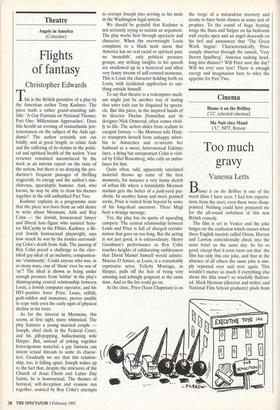Theatre
Angels in America (Cottesloe)
Flights of fantasy
Christopher Edwards
This is the British premiere of a play by the American author Tony Kushner. The piece trails a rather grand-sounding sub- title: 'A Gay Fantasia on National Themes. Part One: Millennium Approaches'. Does this herald an evening of transatlantic por- tentousness on the subject of the Aids epi- demic? The author certainly sets out boldly, and at great length, to relate Aids and the suffering of its victims to the politi- cal and spiritual health of the nation. Your reviewer remained unconvinced by the work as an interim report on the state of the nation, but there is no denying the pro- duction's frequent passages of thrilling stagecraft, its energy and the author's mis- chievous, apocalyptic humour. And, who knows, he may be able to draw his themes together in the still unfinished Part Two.
Kushner explains in a programme note that the piece was born from an odd desire to write about Mormons, Aids and Roy Cohn — the Jewish, homosexual lawyer and liberal hate-figure who assisted Sena- tor McCarthy in the Fifties. Kushner, a lib- eral Jewish homosexual playwright, says how struck he was by the ironies surround- ing Cohn's death from Aids. The passing of Roy Cohn posed a challenge to the cher- ished gay ideal of an inclusive, compassion- ate 'community'. Could anyone who was, in so many ways, one of 'them' ever be one of 'us'? The ideal is shown as being under enough pressure from 'within' in the play's disintegrating central relationship between Louis, a Jewish computer operator, and his 'HIV-positive lover Prior. Louis, selfish, guilt-ridden and immature, proves unable to cope with even the early signs of physical decline in his lover.
As for the interest in Mormons, this seems, at first sight, more whimsical. The play features a young married couple — Joseph, chief clerk in the Federal Court, and his pill-popping, hallucinating wife Harper. But, instead of yoking together heterogenous material, a gay fantasia can invent sexual threads to unite its charac- ters. Gradually we see that this relation- ship, too, is falling apart. Joseph wakes up to the fact that, despite the strictures of the Church of Jesus Christ and Latter Day Saints, he is homosexual. The themes of betrayal, self-deception and evasion run together, assisted by Roy Cohn's attempts
to corrupt Joseph into serving as his mole in the Washington legal system.
We should be grateful that Kushner is not seriously trying to sustain an argument. The play works best through spectacle and character. When the overwrought Louis complains to a black male nurse that America has no real racial or spiritual past, no 'monolith', only political pressure groups, any striking insights in his speech are swallowed up in a hysterical and often very funny stream of self-centred nonsense. This is Louis the character holding forth on Louis, with incidental application to any- thing outside himself.
To say that theatre is a redemptive medi- um might just be another way of stating that utter tosh can be disguised by specta- cle. But this piece, in the inspired hands of its director Declan Donnellan and its designer Nick Ormerod, often comes vivid- ly to life. The action slides from realism to escapist fantasy — the Mormon wife Harp- er transports herself from unhappy subur- bia to Antarctica and re-invents her husband as a sweet, heterosexual Eskimo; later, a dying but unrepentant Cohn is visit- ed by Ethel Rosenberg, who calls an ambu- lance for him.
Quite often, odd, apparently unrelated material throws up some of the best moments, for instance a very funny sketch of urban life where a formidable Mormon madam gets the better of a junk-yard psy- chotic. In another funny and more pointed scene, Prior is visited from beyond by some of his long-dead ancestors. These Magi bear a strange message.
Yes, the play has its quota of squealing campery. The central relationship between Louis and Prior is full of charged recrimi- nation that goes on too long. But the acting is not just good, it is extraordinary. Henry Goodman's performance as Roy Cohn touches heights of exhilarating ruthlessness that David Mamet himself would admire. Marcus D'Amico, as Louis, is a remarkably expressive actor. Felicity Montagu, as Harper, pulls off the feat of being very amusing and achingly poignant at the same time. And so the list could go on.
At the close, Prior (Sean Chapman) is on the verge of a miraculous recovery and seems to have been chosen as some sort of prophet. To the sound of huge beating wings the Stars and Stripes on his bedroom wall cracks open and an angel descends on his bed and announces that 'The Great Work begins'. Characteristically, Prior camply observes through the tumult, 'Very Steven Spielberg'. America rushing head- long into disaster? Will Prior save the day? Will we ever care less? There is enough energy and imagination here to whet the appetite for Part Two.


















































 Previous page
Previous page